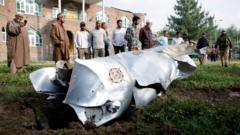Residents express deep concern over increased violence as Pakistan escalates artillery bombardment in Kashmir, resulting in casualties and heightened anxiety among the local population.
Escalating India-Pakistan Conflict: Tensions Rise in Kashmir

Escalating India-Pakistan Conflict: Tensions Rise in Kashmir
Fear Grips Ordinary Citizens Amid Intensifying Shelling Along the Line of Control
As tensions continue to escalate between India and Pakistan, residents in Kashmir are feeling the weight of uncertainty and fear. The situation has grown increasingly alarming following a series of artillery shelling incidents in the India-administered region of Jammu and Kashmir, initiated after India launched Operation Sindoor in retaliation for a deadly terrorist attack on April 22.
Reports indicate that the Pakistani military has intensified its bombardment since earlier this week, leading to significant danger for both local residents and those living further afield in India, ranging from northern Kashmir to the western desert towns of Jaisalmer and Bhuj.
In Poonch, a locality just miles from the contentious “line of control,” Narinder Singh, a retired school teacher, recounted a harrowing reality, stating that at least 13 residents had succumbed to the shelling. “This kind of shelling has never occurred in Poonch town before, not even during the 1971 war,” he remarked somberly. The community is gripped by fear, with markets largely shut down and only essential services operational, as parents educate their children on ways to seek shelter from potential attacks.
The sense of anxiety resonates throughout the towns east of the line of control, with locals improvising strategies for safety amid soaring artillery fire. The persistence of shelling has left many families stranded, fearing the worst while simultaneously placing their hopes in the potential for de-escalation. However, as the bombardments intensify, both government officials and citizens alike remain at a loss about what the future holds for the region, raising concerns about the ever-present threat of conflict spilling over into civilian life.
Reports indicate that the Pakistani military has intensified its bombardment since earlier this week, leading to significant danger for both local residents and those living further afield in India, ranging from northern Kashmir to the western desert towns of Jaisalmer and Bhuj.
In Poonch, a locality just miles from the contentious “line of control,” Narinder Singh, a retired school teacher, recounted a harrowing reality, stating that at least 13 residents had succumbed to the shelling. “This kind of shelling has never occurred in Poonch town before, not even during the 1971 war,” he remarked somberly. The community is gripped by fear, with markets largely shut down and only essential services operational, as parents educate their children on ways to seek shelter from potential attacks.
The sense of anxiety resonates throughout the towns east of the line of control, with locals improvising strategies for safety amid soaring artillery fire. The persistence of shelling has left many families stranded, fearing the worst while simultaneously placing their hopes in the potential for de-escalation. However, as the bombardments intensify, both government officials and citizens alike remain at a loss about what the future holds for the region, raising concerns about the ever-present threat of conflict spilling over into civilian life.

















